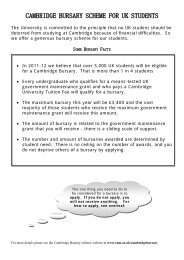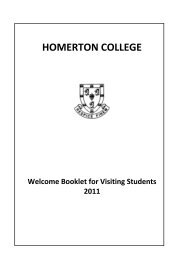ENGLISH AT HOMERTON - Homerton College
ENGLISH AT HOMERTON - Homerton College
ENGLISH AT HOMERTON - Homerton College
Create successful ePaper yourself
Turn your PDF publications into a flip-book with our unique Google optimized e-Paper software.
<strong>ENGLISH</strong> <strong>AT</strong> <strong>HOMERTON</strong> – INFORM<strong>AT</strong>ION AND READING LISTS<br />
Teaching in the English Faculty, as in most Cambridge Faculties, takes three main forms: lectures,<br />
seminars and supervisions.<br />
Lectures are arranged centrally by the Faculty. They last about fifty minutes, and often a lecturer will<br />
offer a course of eight lectures, one in each week of full term. There are no compulsory lectures, and<br />
students are free to attend lectures on areas which appeal to them and which are given by lecturers<br />
whose style they like. Some are on general topics, others are on particular authors or even texts. You<br />
may attend lectures offered by any other tripos (ie, History, Philosophy) if you wish, once you have<br />
found out when they take place.<br />
Seminars are also arranged on a wide variety of topics. These usually consist of groups of 10-15<br />
undergraduates, who meet to discuss their work with one or more member of the Faculty. Discussions<br />
are often informal, and there is usually plenty of opportunity for undergraduates to contribute. Each<br />
specialised paper in Part II has a corresponding seminar, but Part I courses such as Literary Theory<br />
and Language for Literature also have them.<br />
At supervisions undergraduates discuss their recent work with a supervisor. For many students this is<br />
their chief point of contact during a week with a member of the Faculty. The supervisor is very often a<br />
Fellow in English at the student’s own <strong>College</strong>. Many <strong>College</strong>s, however, also send their students to<br />
see experts from other <strong>College</strong>s for some subjects. Since supervisions are arranged by the <strong>College</strong>s<br />
rather than by the Faculty what happens in them varies from <strong>College</strong> to <strong>College</strong>. Usually they last<br />
about an hour and take place once a week; usually they consist of two undergraduates and one<br />
supervisor; and usually each undergraduate would write an essay on a different topic for each weekly<br />
supervision. But these can and do vary.<br />
<strong>Homerton</strong> English<br />
Part I of the Tripos (studied for the first two years) is historical, critically examining texts from the<br />
Middle Ages to the present day, but that doesn’t mean you read everything in order. We encourage<br />
students to make selections, with their supervisors, from the whole range of the course and to develop<br />
their own interests, within the parameters of the papers being studied that term.<br />
In Part II students must offer one, and may offer two, 7,500-word dissertations on subjects of their<br />
own choice and one special subject chosen from a range of 40 or so papers (or one dissertation and<br />
two special papers). All final year students take Tragedy and Practical Criticism, which are at the core<br />
of the Part II course.<br />
At <strong>Homerton</strong>, weekly supervisions are offered on the term’s main course, sometimes supported by<br />
classes widening the discussion of the paper concerned and by supervisions in Practical Criticism. In<br />
addition, in the first two years, teaching can be provided in preparation for the Foreign Language<br />
paper in Part I (or alternatively by the University for the paper on Language for Literature). Note that<br />
Spanish is not a foreign language option for that paper.<br />
In 2009 <strong>Homerton</strong> will offer the Modern (1830-present day) period as the first to be studied, in the<br />
Michaelmas term of your first year, followed by the eighteenth century in the Lent term, and<br />
Shakespeare in the Easter term. In the second year the first term explores Medieval literature; the<br />
second explores Renaissance and seventeenth century literature; and the final term of the second year<br />
is used for revision prior to Part I exams. This programme is flexible and at all times will be linked to<br />
the lectures and seminars offered centrally by the Faculty of English.
Term 1 – Literature from 1830 – the present day<br />
The core components of the first term’s teaching are George Eliot’s Middlemarch and James Joyce’s<br />
Portrait of the Artist as a Young Man. You should ensure you have read these thoroughly during the<br />
summer before you begin. The timetable will map out closely to this:<br />
Week 1:<br />
Week 2:<br />
Week 3:<br />
Week 4:<br />
Week 5:<br />
Week 6:<br />
George Eliot, Middlemarch<br />
George Meredith, Modern Love<br />
Thomas Hardy, Jude the Obscure<br />
James Joyce, Dubliners, Portrait of the Artist<br />
Virginia Woolf, Mrs Dalloway<br />
T.S. Eliot, Prufrock, The Waste Land and other Modernist poetry<br />
Week 7: David Mitchell, Cloud Atlas (2005)<br />
Week 8:<br />
Any text/s from 1830-2010 to be agreed among the group<br />
Additional reading for the first term could include, but is not limited to:<br />
George Eliot,<br />
Charles Darwin,<br />
Charles Dickens,<br />
Thomas Hardy,<br />
The Mill on the Floss<br />
On the Origin of Species Ch. 4 and 5 (1 st or 2 nd edition, preferably)<br />
Bleak House, Great Expectations, Hard Times<br />
Tess of the d’Urbervilles, The Mayor of Casterbridge<br />
G. M. Hopkins, Selected Poetry (Oxford, ed Catherine Phillips)<br />
Virginia Woolf,<br />
T.S. Eliot,<br />
To the Lighthouse, Between the Acts<br />
Collected Poems<br />
These are all suggested texts and are not compulsory, but to get a sense of some of them would be<br />
advantageous. It will be useful to have read Darwin before the first session on Middlemarch. Dickens<br />
is suggested, as his being of such towering importance to Victorian literature, some familiarity of his<br />
works would seem to be essential. Dubliners is included in the main reading list because many<br />
students find it an enjoyable way in to Joyce’s increasingly complex writings (and the ambitious<br />
should not hesitate to move on to Ulysses if they enjoy these texts) It cannot be overemphasized that<br />
anything you read from a period that you enjoy will enhance your appreciation of any of the period<br />
papers, so if you find you especially like Meredith, or David Mitchell, don’t stop with what’s been<br />
suggested here – read and absorb as much by (and about) your favourite authors as you have time for.<br />
Similarly, if Middlemarch sparks your interest in the political or medical debates from the early 1830s,<br />
you should not hesitate to explore the history. Good critical works (NB, York Notes do not count as<br />
good critical works – seek out serious academic criticism) on any text will enhance your appreciation<br />
of them.
Practical Criticism<br />
Every week for the whole of your time studying English at Cambridge you will spend supervisions<br />
looking closely at texts in order to develop your close reading skills. This is known as Practical<br />
Criticism and forms the core of English studies here. Preparation for this is limited but the following<br />
all give very helpful pointers for the student wishing to do well:<br />
I.A. Richards,<br />
Practical Criticism (1929, still in print)<br />
James Fenton, An Introduction to English Poetry (2002)<br />
Derek Attridge, Meter and Meaning (2003)<br />
Pamela Thurschwell, Sigmund Freud (2000)<br />
For convenience, an annotated bibliography and Amazon links to these texts and those on the previous<br />
page can be found at http://bit.ly/dcECsp. Some of Richards’s methods have been adapted since 1929<br />
but the book still serves as a good introduction. Fenton is excellent, and highly readable, on the<br />
minutiae of English verse, while Attridge takes a more detailed and technical look. Thurschwell’s<br />
book is an outstanding and accessible introduction not only to Freud but his role in shaping modern<br />
literary critical theory. And finally, you can never read too much poetry in preparation for a degree in<br />
English.<br />
Lent Term 2011 – Literature from 1688-1847<br />
The main texts studied in the third term will be Defoe’s Robinson Crusoe, selected poems by Pope and<br />
Swift, Richardson’s Pamela, Sterne’s Tristram Shandy, Lewis’s The Monk, Wordsworth’s Lyrical<br />
Ballads, Keats’s Odes and Austen’s Emma. To some extent the course will be shaped around students’<br />
suggestions and preferences, so reading any texts from the period will be good preparation for the<br />
paper. Notes on editions for these texts can be found at http://bit.ly/czajE9. Don’t concern yourself<br />
with other texts listed there, which were from a different year’s syllabus.<br />
Easter Term 2011 – Shakespeare<br />
Aim to have read the ‘core’ text for the Shakespeare paper which is Troilus and Cressida, as well as<br />
three or four each of the comedies, tragedies, and histories as well as a ‘late play’ (The Tempest, A<br />
Winters Tale, Cymbeline, Measure for Measure, Pericles) or two by the time you arrive. Reading very<br />
much more, including the sonnets and longer poems, is not a bad idea.<br />
Faculty Reading lists<br />
The English Faculty website has comprehensive (and sometimes overwhelming) reading lists for every<br />
paper. The reading lists are closed to browsers outside of the central computer system, but if you wish<br />
to expand on your reading before arriving at Cambridge, you are welcome to e-mail the address below<br />
with questions and we’ll do our best to satisfy your enquiry.<br />
Cambridge eight week terms can seem very short when you have big books to read and write about, so<br />
getting an early acquaintance with those you may well want to study later in the year is clearly a good<br />
idea. If you haven’t done much early literature before, then reading some Chaucer, such as a<br />
Canterbury Tale or two, would be useful. Shakespeare figures in all parts of the course, and at the end<br />
of Part I we will expect you to have read the majority of the plays, so getting started on reading more<br />
of his works is crucial. Above all, enjoy your reading.<br />
If you have further enquires relating to your English course at <strong>Homerton</strong>, contact the Director of<br />
Studies in English, Dr David Clifford, via e-mail (djhc2@cam.ac.uk), or by post directly to the<br />
<strong>College</strong>.
















